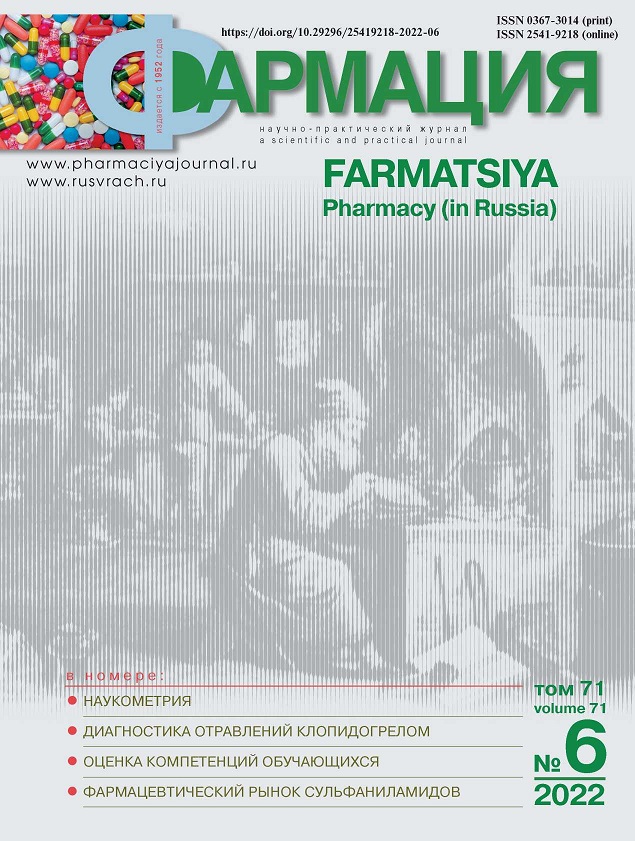Model for assessing competences of medical universities students on the example of the specialty «Pharmacy»
- Authors: Oleynikova T.A.1, Ovod A.I.1, Dremova N.B.1, Ulyanov V.O.1
-
Affiliations:
- Kursk State Medical University
- Issue: Vol 71, No 6 (2022)
- Pages: 34-39
- Section: Organization and economy
- URL: https://journals.eco-vector.com/0367-3014/article/view/113770
- DOI: https://doi.org/10.29296/25419218-2022-06-05
- ID: 113770
Cite item
Abstract
Introduction. The modern pharmaceutical market is in dire need of qualified specialists in the field of scientific, marketing research, production, control and supervision, state registration, wholesale and retail sales of medicines. Pharmaceutical practice is an applied activity that requires students to have scientific and practical experience and a higher level of involvement in working with real cases and situations. To achieve the intended professional outcomes, the university must provide a direct link between the competencies and the learning strategies offered in the curriculum. To ensure that graduates improve their critical thinking and more active participation in the educational process, teachers implementing pharmaceutical programs must carefully choose their teaching and assessment methods. Objective: the formation and description of a model for assessing the competencies of students of medical universities on the example of the specialty "Pharmacy". Material and methods: sources of scientific literature on the development and application of educational technologies, methods for assessing the competencies of students in medical education; methodological materials for the educational program "Pharmacy". To achieve this goal, analytical research methods were used: management (analysis, planning) and systematization (generalization, identification, classification). Results. Based on the results of the study, a model for assessing students in relation to the training of pharmaceutical specialists has been developed, which answers five questions: why, what, how, who and when should evaluate students' competencies. Conclusion. Today, the educational competencies of pharmaceutical specialists are dynamic and their renewal is a continuous process. In this regard, educational organizations need to respond in a timely manner to the challenges of the pharmaceutical labor market in terms of the correspondence of the formed knowledge, skills and abilities to its requirements, as well as change approaches to assessing the competencies of students. As a result, this helps to ensure the achievement of the desired learning outcomes and increase the personal effectiveness of graduates in their professional activities.
Full Text
About the authors
Tatyana Anatolievna Oleynikova
Kursk State Medical University
Author for correspondence.
Email: ol_tanja@mail.ru
PhD in pharmaceutical sciences, associate professor, associate professor of the Department of Organization and Management of Pharmacy
Alla Ivanovna Ovod
Kursk State Medical University
Email: aovod@mail.ru
PhD in pharmaceutical sciences, professor, head of the Department of Organization and Management of Pharmacy
Nina Borisovna Dremova
Kursk State Medical University
Email: prof.dremova@mail.ru
PhD in pharmaceutical sciences, professor, head of the Department of Pedagogy
Vladimir Olegovich Ulyanov
Kursk State Medical University
Email: vo.kursk@mail.ru
PhD in pharmaceutical sciences, associate professor of the Department of Organization and Management of Pharmacy
References
- Кулакова Е.Н., Кондратьева И.В., Волосовец Г.Г., Цуканова Е.С., Гурович О.В. Результаты обучения будущих педиатров: модели и методы планирования. Современные проблемы науки и образования. 2015; 3: 122.
- Садаф Ш., Хан С., Али С.К. Практические советы по составлению валидного и надежного банка вопросов множественного выбора. Медицинское образование и профессиональное развитие. 2016; 2 (24): 80-6.
- Семенова Т.В., Балкизов З.З., Алексеева А.Ю. Обновленный глоссарий терминов в области медицинского образования. Медицинское образование и профессиональное развитие. 2020; 11 (3): 8-20. doi: 10.24411/22208453-202013001.
- Тавакол М., Денник Р. Руководство AMEE № 119. Основы измерения и оценки в медицинском образовании. Медицинское образование и профессиональное развитие. 2021; 12 (1): 20-42. doi: 10.33029/2220-8453-2021-12-1-8-18.
- Ван Тартвийк Ж.В., Дриззен Э.В. Руководство AMEE №45: портфолио для оценки и обучения. Медицинское образование и профессиональное развитие. 2013; 1 (11): 26-54.
- Шамвэй Д.М., Харден Р.М. Руководство AMEE № 25. Оценка результатов обучения компетентного и мыслящего практикующего врача. Медицинское образование и профессиональное развитие. 2016; 1 (23): 23-53.
- Шарифов Г.М.О. Трудности при составлении задач для суммативного оценки в лицеях. Современный ученый. 2020; 2: 58-61.
- Харден Р.М., Лейдлоу Д.М. Ключевые навыки медицинского преподавателя: введение в преподавание и изучение медицины. Пер с англ. под ред. С.Ю. Белогубовой, Ю.И. Рюмшиной. М.: ГЭОТАР-Медиа, 2021. 376.
- Al-Eraky M., Marei H. Свежий взгляд на пирамиду Миллера: оценка на уровне «является» и «делают». Медицинское образование и профессиональное развитие. 2020; 11 (2): 118-26. doi: 10.1111/medu.13101.
- Gilligan A. M., Myers J., Nash J. D., Lavigne J. E., Moczygemba L. R., Plake K. S., Quinones-Boex A. C., Holdford D., West-Strum D., Warholak T. L. Educating Pharmacy Students to Improve Quality (EPIQ) in colleges and schools of pharmacy. American J. of pharmaceutical education. 2012; 76 (6): 109. doi: 10.5688/ajpe766109.
- Ried L.D. A model for curricular quality assessment and improvement. Am. J. Pharm Educ. 2011; 75 (10): 196. doi: 10.5688/ajpe7510196.
Supplementary files







